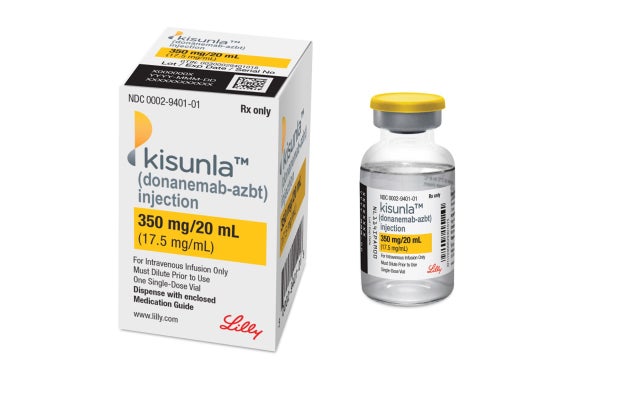CBS News
FDA approves new Alzheimer’s treatment, donanemab from Eli Lilly

The Food and Drug Administration approved a new Alzheimer’s treatment called donanemab on Tuesday, clearing the way for the third addition to a new class of drugs aimed at slowing the brain’s decline in patients facing the early stages of the disease.
Branded as Kisunla by drugmaker Eli Lilly, donanemab’s approval follows years of setbacks and delays in getting the experimental Alzheimer’s treatment to market, despite promising clinical trial results.
Eli Lilly says the drug will be available within weeks following the approval.
The FDA previously rebuffed Eli Lilly’s request for accelerated approval last year, citing concerns about its long-term safety data. After Eli Lilly submitted more data to the FDA, the company said it expected the agency would decide on approval by the end of March.
That decision was delayed after the FDA scheduled an advisory committee to wrestle with questions over the drug’s safety issues and how effectiveness was measured in its trials. The panel ultimately voted unanimously last month in favor of the drug’s benefits outweighing its risks, for patients in the early stages of Alzheimer’s disease.
How does donanemab work?
Donanemab is part of a class of Alzheimer’s treatments called anti-amyloid monoclonal antibodies, which work to combat the buildup of a protein in the brain called amyloid plaque that has been linked to Alzheimer’s disease.
The antibody in donanemab targets amyloid plaques that have built up in patients by binding to and removing them from the brain.
Patients in Eli Lilly’s trials were given intravenous donanemab infusions for around half an hour, every four weeks. Depending on brain scans measuring amyloid levels in the brain, patients were able to stop taking the drug after as early as six months.
In its trials, the company says almost half of patients were able to meaningfully clear out amyloid after around a year after taking the drug. Patients saw no “rebound of amyloid plaque” in the year after treatment wrapped up.
Eli Lily
The only other Alzheimer’s treatment that works in a similar way on the market is lecanemab, branded as Leqembi by drugmakers Eisai and Biogen. An earlier drug called aducanumab (marketed as Aduhelm) from Biogen was discontinued in January.
Beyond effectiveness, Eli Lilly has also touted a handful of other reasons that patients might choose their drug instead of lecanemab.
Donanemab infusions are shorter and less frequent. Trial participants were also able to stop using the drug after amyloid plaque was removed, “which can result in lower treatment costs and fewer infusions,” a company spokesperson said.
How much will the treatment cost?
Eli Lilly says it will launch with a list price of $32,000 for 12 months of treatment, though the actual cost will depend on how long patients take the drug. Last year, Eisai defended its list price of $26,500 per year when it launched sales of Leqembi.
But most patients also do not pay the full list price for prescription drugs. For patients with Medicare Part B, the Centers for Medicare and Medicaid Services said donanemab will be covered in the same way it covers lecanemab (Leqembi), with patients paying a 20% coinsurance after they meet their deductible. These patients will need to get the drug from doctors enrolled in a study gathering data tracking its effectiveness.
“CMS is committed to helping people get timely access to treatments and improving care for people with Alzheimer’s disease and their families,” a CMS spokesperson said.
Eli Lilly noted in a statement: “The potential to complete treatment after a limited-duration course of therapy, along with 30-minute infusions once per month, could result in lower patient out-of-pocket treatment costs and fewer infusions compared to other amyloid-targeting therapies.”
How effective was the treatment for Alzheimer’s symptoms?
Eli Lilly measured donanemab’s effectiveness primarily through rating scales designed to measure the cognitive and functional decline caused by dementia symptoms in patients with early stages of Alzhiemer’s.
Compared with patients who received only a placebo, Eli Lilly said those who got the drug saw their decline slow by up to 22% at 76 weeks after first starting the donanemab infusions.
“Importantly, the magnitude of impact on these clinical endpoints meets, and in several respects exceeds prior approvals for demonstration of clinical benefit and effectiveness,” the company said of the results in a briefing document given to the FDA panel.
The company says this translated to effectively prolonging how long it took until patients stepped down into the next stage of Alzheimer’s disease.
What are the side effects of donanemab?
The labels for all of the anti-amyloid treatments greenlighted by the FDA to date for Alzheimer’s already carry a boxed warning about “amyloid-related imaging abnormalities” that can show up on MRI scans.
While these abnormalities generally result in no symptoms, they have been linked to rare but serious issues in some patients like brain function issues and seizures.
These abnormalities were seen in around a quarter of participants in Eli Lilly’s trials of donanemab. At least five deaths were reported in donanemab recipients in patients with these kinds of abnormalities, mostly from hemorrhages in the brain.
Eli Lilly says their trials of donanemab tested the drug in harder to treat patients than other treatments studied around the same time. That means the trial included older trial participants as well as those with a gene called APOE ε4 that can increase the risk of Alzheimer’s as well as these abnormalities.
Close to 1 in 10 trial participants who took donanemab also experienced a reaction to the infusion, compared to 0.5% of placebo participants. The most common symptoms included chills, skin reddening, nausea, shortness of breath, headache and chest pain.
Approximately 3% of donanemab-treated participants developed hypersensitivity to the infusion, including 0.3% who had a severe allergic reaction.
CBS News
Kamala Harris will speak with “60 Minutes” tomorrow. Here’s what to know for the interview.

Voters will get the chance to hear from Vice President Kamala Harris on Monday as she presents her case for why she should be president in a “60 Minutes” election special.
For decades, “60 Minutes” has featured both Republican and Democratic nominees for presidents, but this year, former President Donald Trump backed out after previously indicating he would be on the show. Correspondent Scott Pelley, who’d been set to interview Trump, will instead travel to Arizona’s Maricopa County, home to more than 60% of Arizona’s voters and a critical battleground in a key swing state.
One thing is certain about the election; with the U.S. deeply involved in both the wars in Ukraine and the Middle East, whoever wins on Nov. 5 will become a wartime president.
What Harris will discuss
Israel’s war started one year ago after Hamas launched a surprise terror attack and correspondent Bill Whitaker will discuss the ongoing war with Harris.
Harris will also discuss the economy, immigration, her record as vice president and the differences between herself and Trump.
Democratic vice presidential candidate Gov. Tim Walz will also appear.
Whitaker joined the Democratic ticket on the campaign trail this week to gain insight into their platform’s priorities and values, and what the candidates believe voters should know.
Why Trump pulled out of the “60 Minutes” interview
Leading up to the candidate hour, Trump, through campaign spokespeople, was the first candidate to accept the “60 Minutes” request to be interviewed for the special, according to CBS News. It had been agreed that both candidates would receive equal time during the broadcast.
Trump last sat down with 60 Minutes in 2020. He walked out during the interview with Lesley Stahl. Trump referenced the incident on Tuesday night at a Milwaukee press conference when asked about his decision not to participate in the Oct. 7 “60 Minutes” election special.
“Well, right now, I went to – they came to me and would like me to do an interview, but first I want to get an apology, because the last time I did an interview with them, if you remember, they challenged me on the computer,” Trump said. “They said the ‘laptop from hell’ was from Russia, and I said it wasn’t from Russia. It was from Hunter, and I never got an apology, so I’m sort of waiting. I’d love to do ’60 Minutes.’ I do everything.”
The Republican nominee for president emphasized that he felt he was owed an apology from “60 Minutes.”
“Let’s see if they do it. I wouldn’t mind doing 60,” Trump continued. “I’ve done ’60 Minutes’ a lot.”
In a statement on Tuesday, Trump campaign communications director Steven Cheung said that Trump’s team had not agreed to an interview.
“Fake News,” Cheung said in a post on X. “60 Minutes begged for an interview, even after they were caught lying about Hunter Biden’s laptop back in 2020. There were initial discussions, but nothing was ever scheduled or locked in. They also insisted on doing live fact checking, which is unprecedented.”
Previous Trump, Harris appearances on 60 Minutes
Trump previously sat down with “60 Minutes'” Mike Wallace in 1985, Pelley in 2015 and Lesley Stahl twice in 2016, first in July of that year and then again in November of 2016. He also spoke with Stahl again in 2018 and 2020.
Harris previously sat down with Whitaker last year. She also was interviewed by Norah O’Donnell, “CBS Evening News” anchor and “60 Minutes” contributing correspondent, in 2020.
How to watch the “60 Minutes” election special
CBS News
Kamala Harris discusses U.S. relationship with Israel

Watch CBS News
Be the first to know
Get browser notifications for breaking news, live events, and exclusive reporting.
CBS News
Nature: Aspens in Utah – CBS News

Watch CBS News
Be the first to know
Get browser notifications for breaking news, live events, and exclusive reporting.








